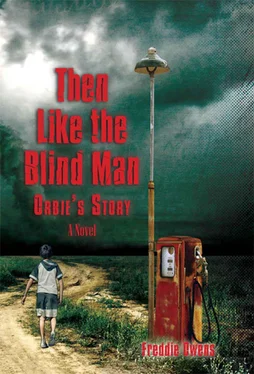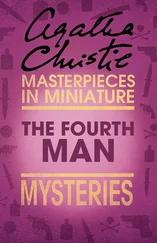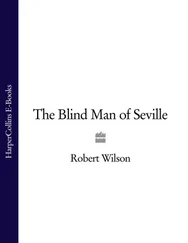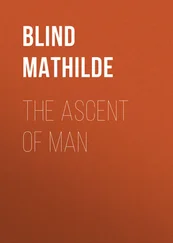“I reckon if you find something on the ground you can read it, can’t you? This was in the driveway.”
“How do you know it’s his?”
“Wrote in his hand, that’s how. I ain’t seen no handwriting finer than Victor’s.”
“You ought to give it back.”
“Well, I reckon I will give it back,” Daddy said. “In good time. You wanna hear what it says? It’s kindly sad and strange at the same time.”
“It ain’t my business.”
“Well, you ought to hear it anyhow. It tells something about him. That we didn’t know about, I mean.”
“Sounds like you’re bound to read it no matter what I say,” Momma said.
Daddy didn’t answer. I heard him and Momma moving around in there, getting ready for bed. It was Momma that spoke up first. “Read it if you aim to.”
“You sure?” Daddy said.
“No. But it ain’t the first time I haven’t been.”
Daddy rattled the paper. He was a slow reader. Some words he stretched out longer than others. Words he didn’t know he had to spell out loud.
“And it is through him,” he read. “I bring the a-b-y-s-s. I don’t know what that is.”
Momma laughed. “A rotten tooth, maybe. One a dentist has to pull.”
“That’s abscess,” Daddy said. “This is a-b-y-s-s. Abiss, I reckon. I don’t know.”
“Read,” Momma said.
The paper rattled, then Daddy’s voice came again. “And it is through him I bring the abiss into my own heart and ask if I am any better. And how life might become worthy, though steeped in this barroom darkness, this gray plastered wall, which has cracked so p-i-t-i, pitifully. And how we might take it along with us, this death, this alcoholic death and its untended women and children to the final s-t-o-i-c — stoik, I reckon is what it says — stoik end of these worlds.”
It got quiet in there a while. Then with tears in her voice Momma said, “I believe he’s talking about his daddy there, Jessie. One killed himself.”
5
Something You couldn’t Do Anything With
It was summertime when Daddy got killed. Then came fall. Dark rainy days and leaves on the ground. It was sad not having Daddy around, kissing on Momma, laughing and talking up things from the factory. I missed his big light-bulb head, his big ears, his hands on Sunday morning, all scrubbed for church, work hands like claws too big for the arms, scrubbed red but still dirty, black lines, factory grease in the knuckle cracks. And how he smelled — I missed that too — like Lava soap and gasoline and cigarettes all mixed in together.
Momma kept to herself; got that purple skin under her eyes. Blood eyes. She wouldn’t put on make up, and she wouldn’t fix up her hair. The house got a gray time. Even the yellow gloss on the kitchen wall had lost its shine. Some of it was ‘cause of gray skies and rainy weather. The rest was just old cigarette smoke and ashtrays that never got dumped.
Momma would lie up in bed or sit in the rocking chair in the living room in front of the TV, smoking one cigarette after another. Sometimes she stayed up late and rocked herself in the rocking chair with the TV set off. It was kind of like she was waiting on Daddy to come home. I would be in the kitchen drawing or playing with my army men and hear her rocking in there with the lights all off. I’d see her cigarette glowing and the shape of her head moving with the rocking chair backlit by the living room window. I would go crawl up in her lap and lay my head against her shoulder. She would put her arm around me then, and I would just be there with her, rocking back and forth, listening to her heartbeat.
———————
One day it snowed so hard they closed all the schools. I was in the living room with Momma and Missy, sitting on the floor with a blanket wrapped about my shoulders. Missy had crawled under the coffee table, and was bashing at her doll’s face with one of Daddy’s old shoes. We were watching one of Momma’s TV programs. A man in a white chef’s hat was chopping celery and talking all serious about chicken salad sandwiches. I thought it was stupid. He put the celery in a bowl with pieces of chicken and mixed in mayonnaise and spices and set it off on the side and started in talking about all the different kinds of bread you could use. I got up with the blanket still around me and went to the front window. Outside was a big man in sunglasses and an orange snowsuit, shoveling snow off the sidewalk in front of our house. The snow was higher than the man’s knees — white and sparkling under a sharp blue cloudless sky.
“There’s somebody out here Momma,” I said. “There’s somebody shoveling our walk.”
“Who? Who is it?”
“I don’t know. He’s orange. He’s got sunglasses and a big bushy hat.”
When Momma looked out the window, she got all happy — then worried. “It’s Victor! I didn’t ask for no help.”
After while he came on the porch and rang the doorbell. Momma put her coat on and opened the door. I pulled the blanket tight around my shoulders and went next to Momma. The day was so bone chilly cold the insides of my nose holes stuck together. I looked up at Victor. “Momma said she didn’t ask for no help.”
“Hush,” Momma said. “I was just thinking how you ought not have bothered with all that, Victor.”
Victor smiled. He looked at us through the dark glasses, his voice all deep and friendly-like. “Jessie was my best worker. A good friend. I’m honored to help you Ruby.”
Victor’s breath came out in little white rags of steam that vanished almost as soon as they appeared. Snow shovels scraped in the distance. Victor’s pickup truck sat in our driveway with a plow blade straight across the front. All the snow behind Momma’s Ford had been cleared away. Momma looked at it all and started to cry.
“You and the children,” Victor said. “Orbie here, and Missy, well, you’ve become almost like family to me.”
“I know, I know. I’m sorry. It’s just…it’s been so hard.” Momma pulled a Kleenex out of her coat pocket and blew her nose. “I can’t talk about it right now.”
“You don’t have to Ruby. I understand. You need time.” Victor lifted the snow shovel onto one shoulder. “We all need time.”
———————
It wasn’t two days Victor called again. He kept on calling too, checking was everything all right, was there anything he could do? Finally, Momma let him come and fix the basement windows. Then a whistling noise in the refrigerator wouldn’t go away and he had to fix that too. He shoveled more snow. He spread salt over our icy front steps. He spread it along the sidewalk in front of our house. In the spring time he came and raked dead leaves, got Daddy’s old push-mower out and cut the grass.
People in the neighborhood liked Victor, all except our baby sitter, Mrs. Profit, who was bone skinny and nervous and talked a mile a minute. She didn’t like it when Victor made things simple so she could understand, when he tried to talk like a hillbilly, saying things like You all come , or Fair to middlin’ .
“Why, he don’t even got the accent,” she said to Momma one day. “He’s a broke-mouthed hillbilly you ask me.”
“People over to church think it’s sweet,” Momma said.
“Sweet? Well, I don’t. It’s like he’s talking down to me. Like he thinks I’m dimwitted or something.”
“Oh, I think he’s just trying to get along,” Momma said.
Mid spring he was calling Momma every week. Then it seemed like everyday. Everyday, there Momma would be, talking to Victor on the telephone. She was still on bad times though, Momma was. She cooked and cleaned house, got Missy and me washed up and ready for bed. She was our mother, and she loved us, but I could see there was still something sad she was dragging around inside. It was like a dead cat I saw once all froze up in the back yard, something you couldn’t do anything with.
Читать дальше












